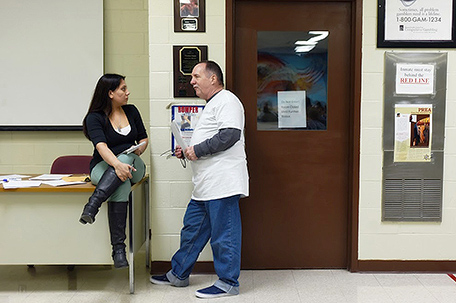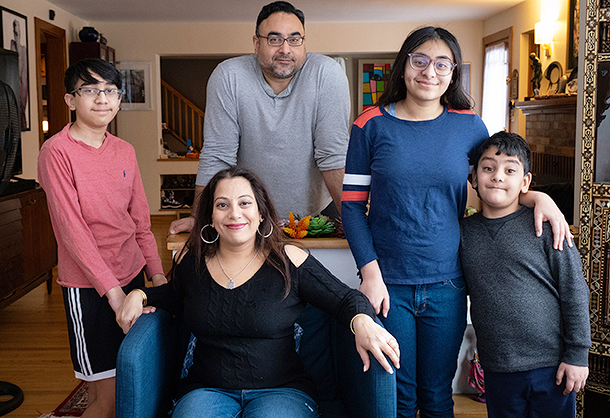
ABOVE PHOTO: Pasha at the Hampshire County Jail in Northampton, Mass. where she volunteered as a teacher. (Photo by Brian McDermott)
By Melissa Manno

PNA
The Prison Journalism Project idea is born
As she was teaching at the University of Massachusetts and enjoying her family, Shaheen Pasha kept thinking about a conversation she had with MaQbool years prior, when he said, “Everyone has a story in here. You should hear them.”
MaQbool revealed to Pasha how little she knew about life inside prison walls and the stories of those living there. She realized that if she, someone with an incarcerated loved one, knew so little, then the majority of Americans were completely in the dark.
“There’s this whole world of 2.3 million people in prisons, the size of a small country,” Pasha said. “How do you have an entire country with no journalism coming out of it besides outside reporters only seeing what the government allows them to?”
Pasha said this realization was “the lightbulb that went off and told me this is what I’m supposed to do with the rest of my life.”
She began brainstorming how she could use her skills as a journalist and a professor to bring change to the prison system. Hampshire County Jail in Massachusetts gave her that answer.
Pasha reached out the jail’s education administrators and inquired about becoming a volunteer teacher and working with inmates. At first, the officials were thrilled — that is, Pasha said, until they heard the course she intended to teach was journalism. Pasha said this negative reaction was due to the “contentious, antagonistic relationship” that often exists between correctional institutions and news organizations.
“There’s a lot happening behind the walls that they don’t want to be shown on the outside, and as journalists, we are all about burning everything down and uncovering corruption,” Pasha said. “Places like prisons and jails are very opaque and don’t want people in its business while journalists’ very job is to be in people’s business.”
Pasha decided to modify her approach. “Media writing,” she called it: a course focused on nonfiction story writing, interview skills and media knowledge. It was the very essence of an introduction to journalism class, simply rebranded.
“The class was a success,” Pasha said. “The guys loved it. They loved knowing their stories were worthy of something and loved learning ways to make their experiences into something people could read.”
This experience led Pasha to team up with a colleague and create a college course that brought students into the jail where they partnered up to do explanatory journalism — with the incarcerated individuals reporting on the inside and the college students reporting on the outside.
The results, Pasha said, were not only inspiring but impressive. Stories gave insight to critical issues for many incarcerated individuals — from the challenges of parenting behind bars to the struggles of being issued incorrect mental health medication.
Prison administrators also saw firsthand the positive impact Pasha had on the inmates involved, and they began to trust her endeavors in the classroom.
In 2018, she was awarded a Nieman Visiting Fellowship at Harvard University, which enabled her to study how to jumpstart a nationwide initiative and teach journalism inside prisons.
One of the publications she researched was the San Quentin News, an award-winning prisoner newspaper in California that employs roughly 15 incarcerated men.
When Pasha met one of the publication’s professional advisors, Yukari Kane, Pasha said there were “instant fireworks,” and the Prison Journalism Project idea was hatched.
“We were both teaching journalism education in prisons in different parts of the country but coming at it with the same perspectives and motivations,” Kane said. “It made sense to partner so we could create something bigger and start this nationwide journalism education program that could be used more broadly.”
Kane said the Prison Journalism Project provides the public with a perspective that is largely missing in the media.
“There’s a lot of really good journalism and investigative reporting on criminal justice issues, but most of the voices are from outside reporters and journalists,” Kane said. “We feel that there’s this massive piece missing, which is the inside perspective.”
Now, as the program’s co-founder and co-executive director alongside Pasha, Kane said she’s been thrilled by the support from both the journalism industry and prison education sector.
“The best thing is when an amazing story comes in by a writer who’s had virtually no experiences with writing, and it’s about something that you didn’t have a clue about,” Kane said.
“It just confirms our beliefs that there are journalistic stories like these that need to be read.”
She reflected on a story written by Ralph Kayden, an inmate who collects stamps in prison. He wrote about how although he lost many personal possessions before coming to prison, his family saved his mint condition stamp collection and have slowly sent parts of it back to him, which he uses to send mail outside — ensuring that the stamp he uses matches the recipient’s interests.
In this narrative, Kayden explained how stamp collecting fulfils his life in a California State Prison. Kane said the piece demonstrates the power journalism can play in changing people’s perceptions of those inside prisons.
Around the same time Pasha met Kane, she also conducted an interview with one of the San Quentin News’ top journalists, John Lennon. She told him about her vision for the Prison Journalism Project.
Lennon said while his initial reaction was that it would be difficult to pull off, he is happy that Pasha and Kane proved him wrong.
Now, as he serves 28 years-to-life at the Sullivan Correctional Facility in Fallsburg, New York, for murder and selling drugs, Lennon works as one the project’s advisers while documenting life in a maximum-security prison. He describes the project as a powerful tool to create change.
“It’s Shaheen’s loyalty and dedication to service that has made this project come to life,” Lennon said. “She never turned her back on someone she once loved. And yet, she’s a wife, a mother of three, a professor and runs this project with Yukari. She’s a machine, but she’s helped me understand the importance of service.”

Pasha and Kane have used The Prison Journalism Project to help inmates write about and publish what it’s like to be incarcerated during a pandemic. The submissions can be found on https://prisonjournalismproject.org/.
“It’s a humanitarian crisis by any count,” Pasha said. “The mismanagement of the pandemic is basically giving a life sentence to people who aren’t in prison to die.”
Pasha said prisoners are afraid to tell fellow inmates or prison officials that they’re feeling sick because they’ll be put into solitary confinement.
“We are not solitary creatures,” Pasha said. “If you leave someone in a small cell in the dark where they can’t interact with other human beings or go outside for more than one hour a day, you’re ensuring that their mental health is going to suffer.”
She reflected on the experiences of a formerly incarcerated man she now works with who spent three years in solitary and spent much of his time talking to roaches. She said he’s out of prison now and can’t kill roaches, because in solitary confinement roaches were his friends.
There are stories on the website on a variety of contemporary issues, such as Black Lives Matter and the 2020 presidential election. The project has gone beyond working with inmates to write articles. Pasha and Kane are developing a textbook and curriculum to use in immersive courses.
Pasha left UMass after six years and took a job as an assistant teaching professor at Penn State. Within her first year, she laid the groundwork for a course at Penn State, where students will go inside prisons and work directly with inmates.
The COVID-19 pandemic has put the course on hold, but Pasha has continued to find ways to educate journalism students about the lives of incarcerated individuals.
She’s teaching a course called “The Media and Uncovering Stories of Mass Incarceration,” which explores how traditional media covers people in prison. Penn State junior Rachel Rubin, who was in the class last fall, said she was impressed by Pasha’s wittiness, intelligence and devotion to her students.
“She fostered a perfect environment for learning and developing as a person,” Rubin said. “The class wasn’t just about writing stories.
She taught us how journalism can help people communicate and how important it is to relate to those who are different than us.”
Giving prison inmates a means to express themselves remains Pasha’s overarching goal.
One of the Prison Journalism Project’s contributing writers is MaQbool, Pasha’s friend whose incarceration 18 years ago help to inspire the program. In an email, he described the start of the Prison Journalism Project as being “a very happy moment.”
“Police, prosecutors, judges, lawyers and media speak,” MaQbool said. “People who we have never even met provide intricate analysis of our psyche.
You have no idea how emasculating and suffocating that ordeal is. And it doesn’t end there, it starts anew behind prison walls, where not only us, but our voices are held captive as well.”
MaQbool said the Prison Journalism Project provides an avenue for incarcerated people “to finally speak, to tell our stories and truths and to be actually heard for a change.”
As he continues to serve his life sentence, he said this project provides him not only with an expressive outlet but the ability to define himself.
“I am proud of what the project stands for and represents,” MaQbool said. “Writing is cathartic and to be able to tell your own story provides some semblance of solace. But providing a voice to the condemned isn’t easy. It reflects courage.”
When asked how he would describe Pasha, MaQbool couldn’t resist the opportunity to mess with his best friend, calling her “a destroyer of Pakistani cuisine.”
While Pasha pointed out that MaQbool has never actually tried her cooking and that “if he has the chance to, he’ll be eating his words,” she also emphasized that these jabs display the two’s playful relationship.
Speaking more seriously, though, MaQbool described his friendship with Pasha by sharing a quote from Oprah Winfrey: “Lots of people want to ride with you in the limo, but what you want is someone who will take the bus with you when the limo breaks down.”
It’s been almost two decades since Pasha and MaQbool were able to meet face to face without the constraints of time limits and barred doors — and yet, despite Pasha becoming an accomplished journalist, professor, advocate, wife and mother of three, MaQbool said she’s also managed to keep the title of best friend.
“To me loyalty is one of the highest and the most noble of traits. It reflects a person’s humanity,” MaQbool said. “Shaheen Pasha is a living breathing symbol of humanity.”
















Leave a Comment